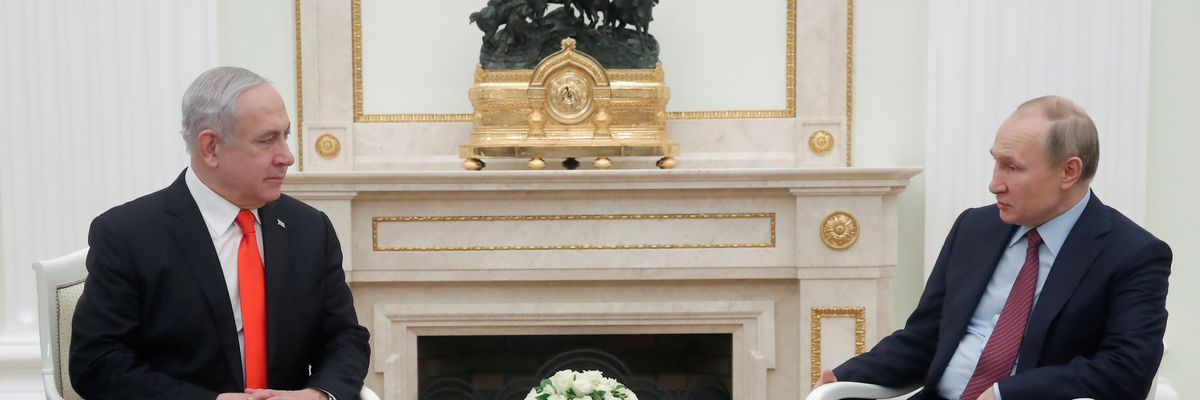Russian Foreign Minister Sergei Lavrov and other Russian officials have called for a ceasefire in the most recent outburst of Israeli-Palestinian conflict triggered by Hamas’s recent surprise attacks on Israel.
Moscow has also warned that the conflict could spread and has criticized U.S. Navy deployments in the vicinity of the Gaza Strip.
Yet while the Russian government has adopted a “balanced” position with regard to the Israel-Hamas conflict, a number of prominent Russian commentators have issued statements that have been highly critical of Israel and sympathetic toward the Palestinians (if not toward Hamas itself). While these statements do not necessarily reflect Kremlin views, it is doubtful that these commentators would make them if the Kremlin strongly objected to them. What seems to bother these commentators is the continued closeness of Israeli-American relations, as well as the possibility that the West will somehow benefit from this situation (Russia also has its “worst case analysts”).
As of this writing, according to the Washington Post on Tuesday, the Kremlin has not offered condolences to Israel nor has President Vladimir Putin called Prime Minister Benjamin Netanyahu, even though the two have had a reportedly close relationship.
While Moscow has good relations with Iran, Hezbollah, and Hamas, it has a strong incentive to maintain good relations with Israel. Although Russian-Israeli relations have become strained as a result of the Russian-Ukrainian war, as well as Moscow’s reliance on Iran for armed drones for attacking Ukraine, Moscow has appreciated how Israel has resisted both American and Ukrainian pressure to supply Israeli weapons to Kyiv. If the Israeli government became convinced that Moscow supported the Hamas attack on Israel, then Israeli reticence about supporting Ukraine could suddenly end.
Of course, Israel is not going to be supplying weaponry to Ukraine so long as its conflict with Hamas is ongoing. Some, then, might see the Israeli-Hamas conflict as useful in preventing this or in America diverting weapons that it might have supplied Ukraine to Israel instead. Presumably, though, the hot phase of Israel’s conflict with Hamas will require far fewer weapons, and much less time, than Ukraine’s war with Russia, and so the diversionary potential of the Israel-Hamas conflict will not benefit Moscow for long, if at all.
Further, Moscow’s warnings about conflict in the Middle East spreading are an indication that it fears its own interests would be harmed if this occurs. An all-out conflict between Israel and Hezbollah could result in Hezbollah’s forces in Lebanon becoming so degraded that it will be forced to redeploy a substantial number of its fighters now in Syria back to Lebanon, thus destabilizing the Russian-backed Assad regime, which relies in part on Hezbollah’s military prowess. Escalating conflict between Israel and Iranian forces in Syria could result in the Assad regime becoming vulnerable once again to its internal opponents.
Just as Russia being bogged down in Ukraine did not act to protect Armenia against Azerbaijan, the exigencies of Moscow’s war against Kyiv might result in Moscow being unable to help Iranian or Hezbollah forces against Israel. The two situations are not directly comparable: Putin has been unhappy with what he perceives with the pro-Western government in Armenia while he has no such concerns about Iran or Hezbollah. But Putin simply might not be able to spare the resources needed to defend Hamas, Hezbollah, and Iranian forces in Syria against a determined Israeli assault supported by the U.S.
While many in the West seem to think that Russia somehow benefits whenever conflict erupts in the Middle East, this might be an occasion when it does not. Moscow may be calling for a ceasefire, then, because it sees this as the best way to protect its interests. The problem for Moscow, however, is that it is not in a strong position to either persuade or coerce Israel or Hamas to agree to one. Perhaps this is why Foreign Minister Lavrov indicated that President Putin would not be making calls to any other leaders about this.
The ongoing conflict between Israel and Hamas is one which could affect Russian interests negatively, but which Russia has only limited ability to affect.
- Hawks want Biden to take the fight with Russia global ›
- Why Hamas attacked and what happens next ›
- Russia's Lavrov lays it on thick for Middle East audience - Responsible Statecraft ›
- Syria's stakes in the Israel-Gaza war - Responsible Statecraft ›
- Netanyahu seeks Putin’s help with hostages in Gaza | Responsible Statecraft ›














